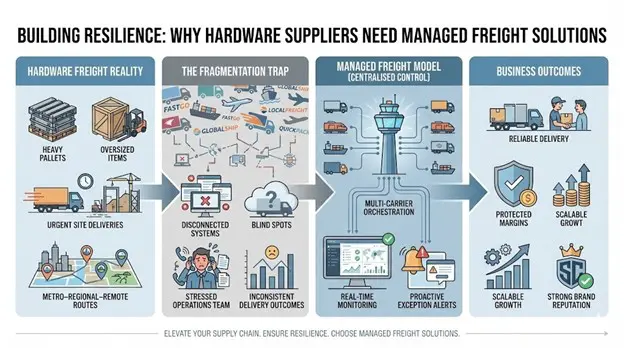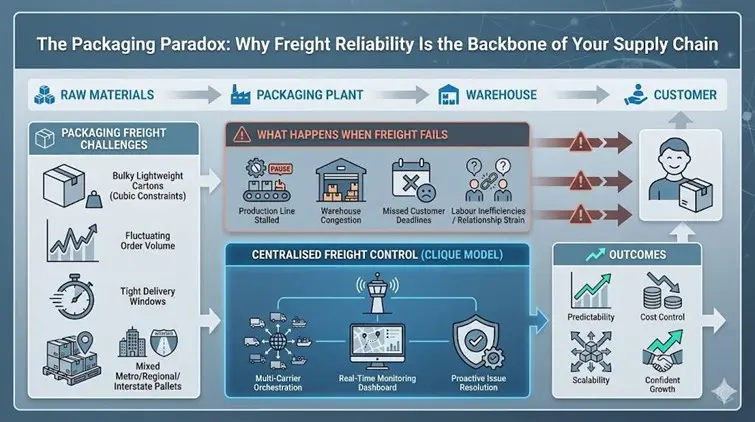What is Freight Management: insights into the Process
In the intricate world of logistics, freight management plays a central role in ensuring that goods move seamlessly from origin to destination. At Clique Logistics, we believe that effective freight management is about much more than getting from point A to point B. It’s about creating a positive impact on businesses, customers, and the environment.
Here’s how we do it.
Freight Management: A Journey of Precision and Purpose
Imagine a perfectly conducted orchestra—each section works together to create harmony. Freight management is similar, blending various logistical elements to ensure on-time, cost-effective, and safe delivery across the country and beyond. This task requires not only technical expertise but also a strong sense of purpose and dedication to meeting our customers’ specific needs. Clique’s unique approach revolves around our 9:9 Never Customer Promise, where every call is answered in 9 seconds, emails are replied to in 9 minutes, and customers never have to chase up the same issue twice.
Why Freight Management Matters
- Time is Money
- A delay can cause bottlenecks, lost sales, and missed opportunities. Clique’s proactive approach to freight management—anticipating issues and resolving them quickly—helps clients keep their supply chain on track and maintain a competitive edge.
- Maximise Value
- Freight expenses affect the bottom line. By optimising routes and working with the best carrier partners, Clique Logistics focuses on delivering value for every dollar spent. Our carrier optimisation ensures efficient transportation without compromising quality or reliability.
- Customer Satisfaction
- Clique understands that customer satisfaction hinges on prompt, dependable deliveries. We’re proud of our Net Promoter Score (NPS) of +60, a testament to the trust and satisfaction we bring to our clients. Through real-time tracking and transparent communication, we ensure that customers are always informed, so there’s no guessing involved in their delivery experience.
- Sustainability
- At Clique, we strive to make freight management environmentally responsible by optimising load capacity and consolidating shipments to reduce our carbon footprint. This not only minimises costs but also supports our clients’ sustainability goals.
Key Components of Effective Freight Management at Clique
- Strategic Route Planning
- Clique’s commercial freight experts use sophisticated tools and industry insight to plan efficient routes, keeping costs low while ensuring timely deliveries. This minimises delays and helps us handle any unexpected challenges proactively.
- Carrier Selection
- Our team’s deep knowledge of carriers enables us to partner with those who align with our standards for reliability and accountability. We prioritise strong, lasting partnerships that help us provide the best experience for our clients.
- Tracking and Monitoring
- Clique offers real-time tracking for all shipments, giving clients visibility and control over their goods. This technology supports our mission to deliver hassle-free freight management and keeps clients in the loop every step of the way.
- Risk and Compliance Management
- Staying compliant with national regulations is key to avoiding delays and penalties. Clique’s dedicated risk management team continuously monitors and updates compliance measures, ensuring our clients’ cargo moves smoothly.
- Continuous Improvement
- Beyond route optimisation, we provide comprehensive cost analysis to identify savings opportunities and pass these benefits to our clients, without cutting corners on service quality.
Embracing Technology in Freight Management
- Real-Time Data and Predictive Analytics
- With data-driven insights, Clique can anticipate potential delays and recommend alternative solutions before issues arise. This approach reduces downtime, improves efficiency, and ensures reliability.
- Automation
- Technology allows us to handle routine tasks swiftly, freeing our team to focus on high-level strategy and customer service. By automating invoicing, scheduling, and route optimisation, we increase accuracy and efficiency.
Navigating Challenges in Freight Management
Freight management is a fast-paced, vital industry with unique challenges that require strategic thinking, adaptability, and creative solutions. To help businesses keep their supply chains strong, freight managers work tirelessly to address these complexities.
Fuel Price Variability
The ever-fluctuating nature of fuel prices presents one of the most prominent challenges in freight management. As fuel costs rise and fall unpredictably, the expenses involved in transporting goods can vary widely, impacting companies reliant on tight budgets and precise financial planning. Freight managers must balance these financial changes while ensuring consistent efficiency and reliability.
Regulatory Compliance
Staying up-to-date and compliant with regulatory requirements is a multifaceted challenge, especially in international logistics. Different regions enforce unique rules and standards, which freight managers must navigate to remain compliant. New environmental regulations add another layer of responsibility, encouraging more sustainable practices across the industry.
Supply Chain Disruptions
Freight management is also impacted by unexpected supply chain disruptions, whether due to natural disasters, political events, or shifts in trade policies. These disruptions can delay shipments, increase costs, and impact customer satisfaction, making flexibility and quick decision-making essential for keeping operations on track.
Technological Advancements
While technology drives efficiency, adopting new systems comes with its own hurdles. Integrating new technology with existing processes requires time, training, and resources. Freight managers are continuously working to ensure that these transitions happen smoothly without disrupting service levels.
Intense Competition
With a crowded and competitive market, logistics providers must constantly innovate and deliver exceptional service to stay ahead. The ability to respond rapidly to market shifts and customer needs is vital to remain competitive in this dynamic landscape.
Managing the Human Element
Finally, effective freight management also relies on the people behind the scenes. Ensuring driver safety, adhering to labour regulations, and maintaining a skilled workforce despite labour shortages are crucial in creating a reliable and resilient freight network.
The Human Touch at Clique: Beyond Logistics
While technology is essential, the human element remains at the core of Clique’s freight management. Our team of experienced professionals—from customer support to account managers—understands that building strong relationships is crucial for success. At Clique, we see freight management as more than logistics; it’s about supporting our clients, empowering our team, and adding genuine value.
Why Choose Clique Logistics for Freight Management?
We don’t just move cargo; we protect and enhance our clients’ reputations with every shipment. Our high-performance team is dedicated to delivering a 10 out of 10 experience with personalised solutions that prioritize your business goals.
In conclusion, freight management is more than just a logistics function; it’s an essential part of a successful business strategy. With the right partner like Clique Logistics, freight management can help businesses drive growth, reduce internal, and keep customers satisfied. Whether you’re looking for reliable on-time delivery, cost-effective solutions,




